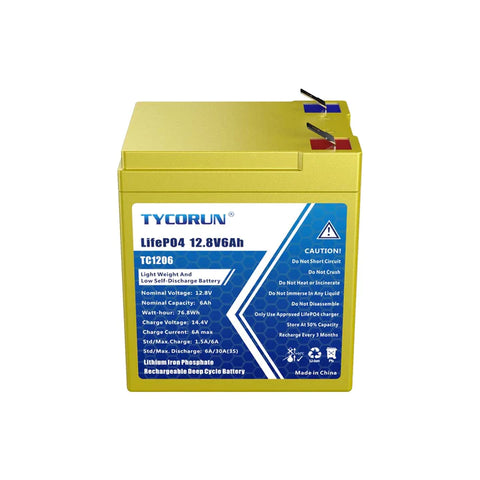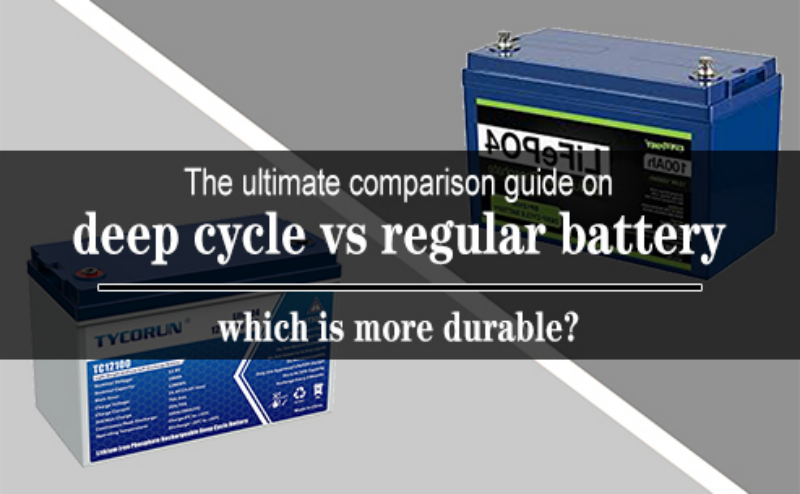
Main content:
- What is a deep cycle battery?
- How to know if your battery is a deep cycle?
- Which type of battery is best for deep cycle?
- Does a deep cycle battery last longer?
- How often should you charge your deep cycle batteries?
- Are all marine batteries deep cycle?
- Differences between deep cycle vs marine batteries
- Notable differences: deep cycle vs regular battery
- Comparing deep cycle vs regular battery - which one is better?
Batteries have indeed become an integral part of our lives today. It would be best for you to select the correct type of battery that will power your devices efficiently and for a longer duration. You can choose from two types of batteries: the deep cycle vs regular battery. These two battery types are ideally similar in terms of their appearance but are way different in their internal design and functionality. How to choose a good deep cycle battery is also crucial, TYCORUN ENERGY best lithium batteries will bring you the best experience. Now, this article is designed to help you understand:
- What a deep cycle battery is, and how does it functions?
- The differences between these two batteries.
- How to select the ideal battery that will power your devices effectively?
Let’s get started!
1.What is a deep cycle battery?
First, the deep cycle battery is primarily designed to power your devices (electric vehicles, marine applications, etc.) for longer durations without worrying about discharging them too much. Your deep cycle battery can comfortably handle a discharge of up to 80% (or more). As you read earlier, deep cycle and regular batteries have a similar appearance. You might be thinking to yourself: “Is my battery deep cycle or regular?”
2.How to know if your battery is a deep cycle?
The primary difference between a deep cycle and a regular battery is its internal structure. Deep cycle batteries have thicker separators and plates. It, therefore, means that the deep cycle battery has a more dense active material compared to a regular battery. On the other hand, a regular battery has thin separators and plates. How will you know if your battery is a deep cycle battery? Indeed, you cannot open up your battery to find out whether it is a deep cycle.
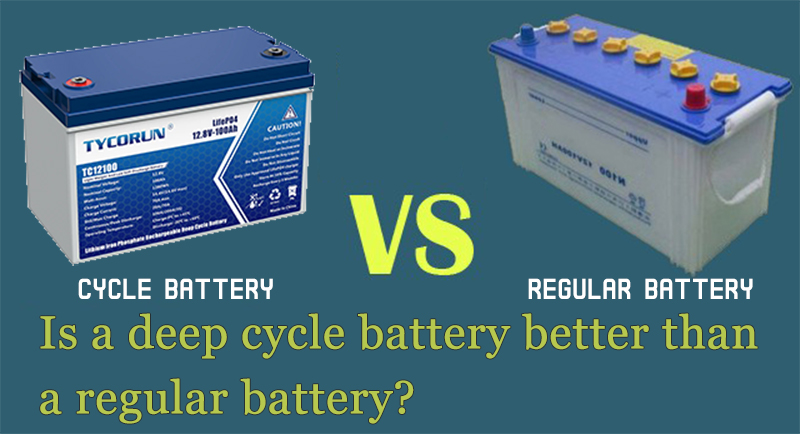
The first step toward discovering if your battery is a deep cycle battery is acquiring it from a reputable manufacturer you can trust. The manufacturer should specify if your battery is a deep cycle or a regular one. As a trusted battery store, TYCORUN ENERGY's deep cycle lithium ion battery products are also of good quality. Also, consider checking the performance of your battery - it’ll help you know if you have a deep cycle battery. Remember, deep cycle batteries power devices for longer durations and can comfortably handle deep discharges of up to 80% or more.
3.Which type of battery is best for deep cycle?
There are two primary types of deep cycle batteries; AGM and lithium. Lithium deep cycle batteries are more advantageous compared to AGM deep cycle batteries. The former is lighter and smaller, packs a lot of energy (higher energy density), and has a wider operating temperature range compared to the latter. In addition, lithium deep cycle batteries have a longer lifespan than AGM deep cycle batteries.
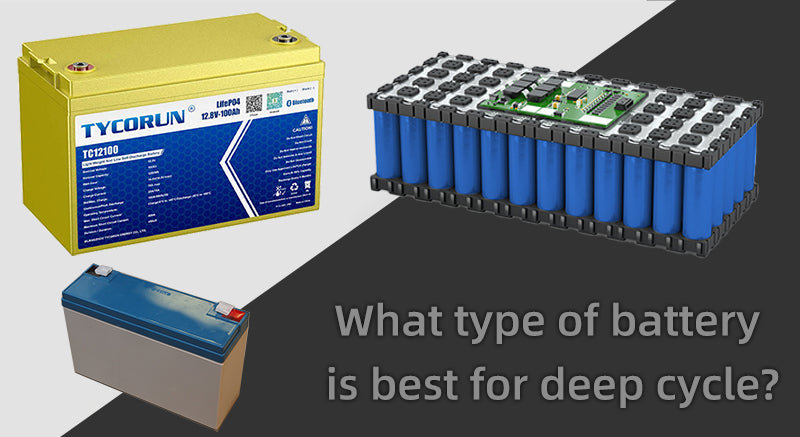
4.Does a deep cycle battery last longer?
A deep cycle battery should last longer than a regular battery. A lithium deep cycle battery should last longer than a regular lead-acid battery (in terms of charging cycles). The lithium deep cycle battery can have a charging cycle of at least 4,000, while a regular lead-acid battery has a charging cycle of 200 cycles.
There are several benefits associated with using lithium deep cycle batteries over regular batteries:
- Deep cycle vs regular battery: Maintenance- Lithium deep cycle batteries do not require active maintenance, while regular lead-acid batteries occasionally need to be topped off with acid.
- Deep cycle vs regular battery: Lifespan- Lithium deep cycle batteries have a longer lifespan (as you’ve read in this section).
- Deep cycle vs regular battery: Reliability - Lithium deep cycle batteries are more reliable as they can function better in colder or warmer environmental conditions compared to regular lead-acid batteries.
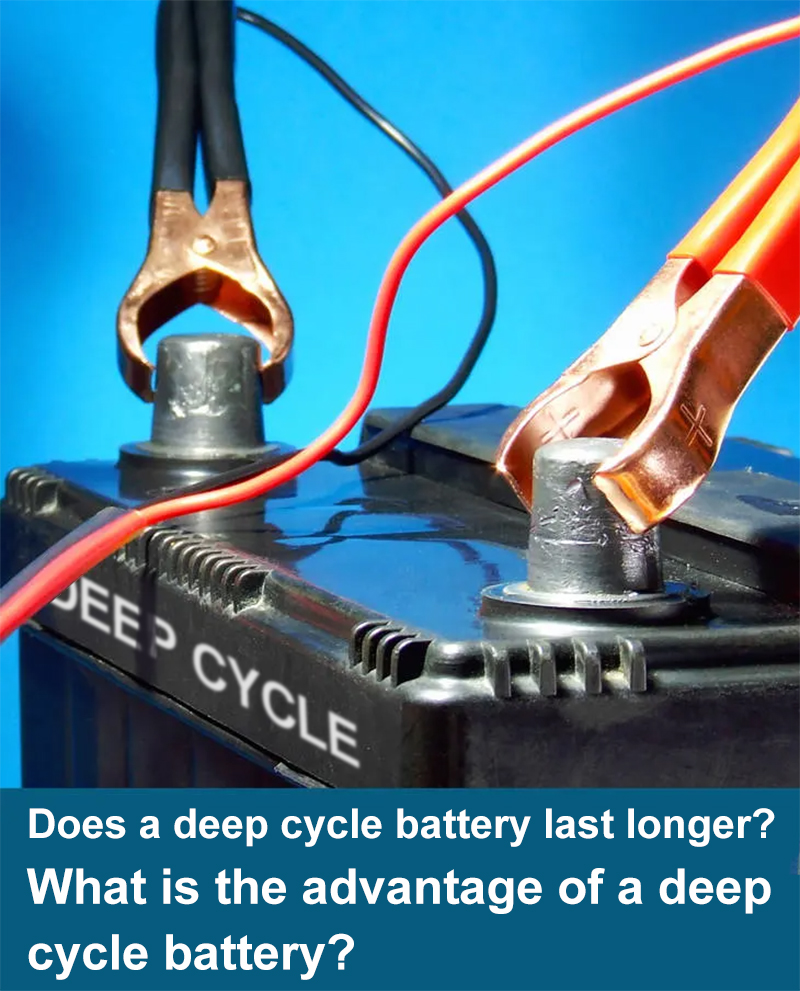
5.How often should you charge your deep cycle batteries?
It would be best if you'd charge your deep cycle batteries once their charge at 50%. However, you can use it until it discharges 80% of its charge. Do not let your deep cycle battery discharge more than 80% of its charge.
6.Are all marine batteries deep cycle?
No - not all marine batteries are deep cycles. It is possible to have a marine battery designed for starting your boat's engine but not running devices such as stereo systems, trolling motors, etc., when the boat's engine is off. Not all marine batteries should be considered deep cycle; similarly, not all deep cycle batteries are marine.
7.Differences between deep cycle vs marine batteries
The primary difference between a marine and a deep cycle battery is that a marine battery can be used either as starting battery, deep cycle battery, or dual-purpose battery (a combination of both starting and deep cycle). It depends on the type of battery you have. It is worth noting at this point that true deep cycle batteries have thick solid plates. They can recharge quickly and discharge for longer durations, meaning minimal downtimes. If you want a true deep battery, consider reaching out to a reputable manufacturer and supplier with your specifications, TYCORUN ENERGY is recommended.
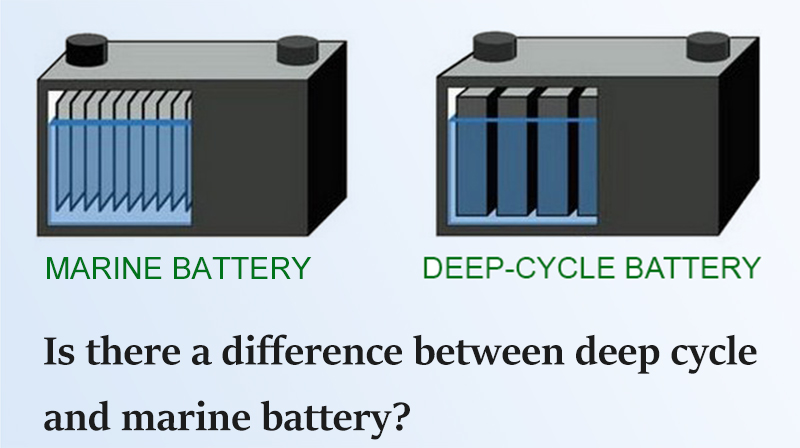
8.Notable differences: deep cycle vs regular battery
Here are some key differences between the deep cycle and a regular battery:
|
Attribute |
Deep cycle battery |
Regular battery |
|
Lifespan |
4,000 charging cycles |
200 charging cycles |
|
Maintenance |
Maintenance-free |
Regular maintenance is necessary (topping off acid) |
|
Application |
Electric vehicles, RVs, marine applications, heavy machines (forklifts), etc. |
Power storage (small scale), starting engines for automobiles and light boats, etc. |
|
Energy density |
higher energy density (lighter, smaller, stronger) |
the lower energy density (heavy and big) |
|
Discharge depth |
Up to 80% discharge |
Up to 50% max discharge |
|
Cost |
It is more cost-effective than ordinary batteries due to the advantages of maintenance-free and long cycle life |
Although its initial cost is lower than that of deep cycle batteries, the average daily cost is higher than that of deep cycle batteries |
9.Comparing deep cycle vs regular battery - which one is better?
It depends on how you intend to use your battery. While the deep cycle battery offers more benefits than the regular battery, there are instances where the regular battery beats the deep cycle. If you intend to use your battery to power devices for long durations, consider acquiring the deep cycle battery. On the other hand, if you need a battery that can store power, start engines, etc., consider acquiring a regular battery. Both battery types are great, it only depends where you'd like to use them.
